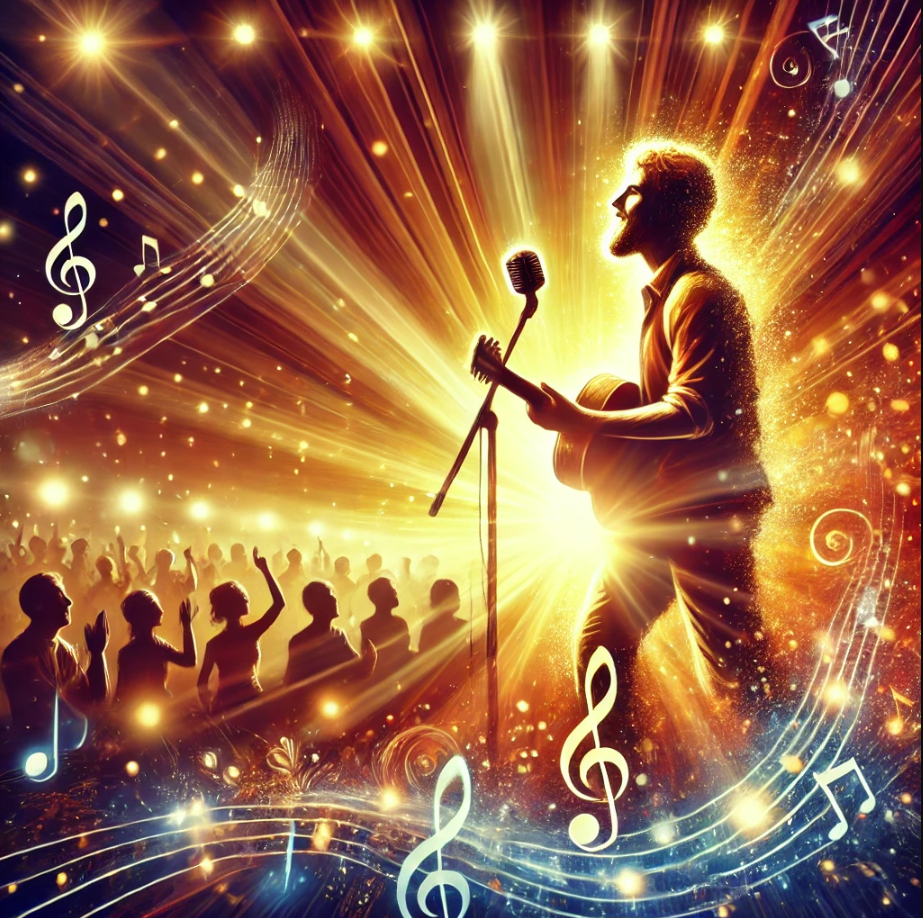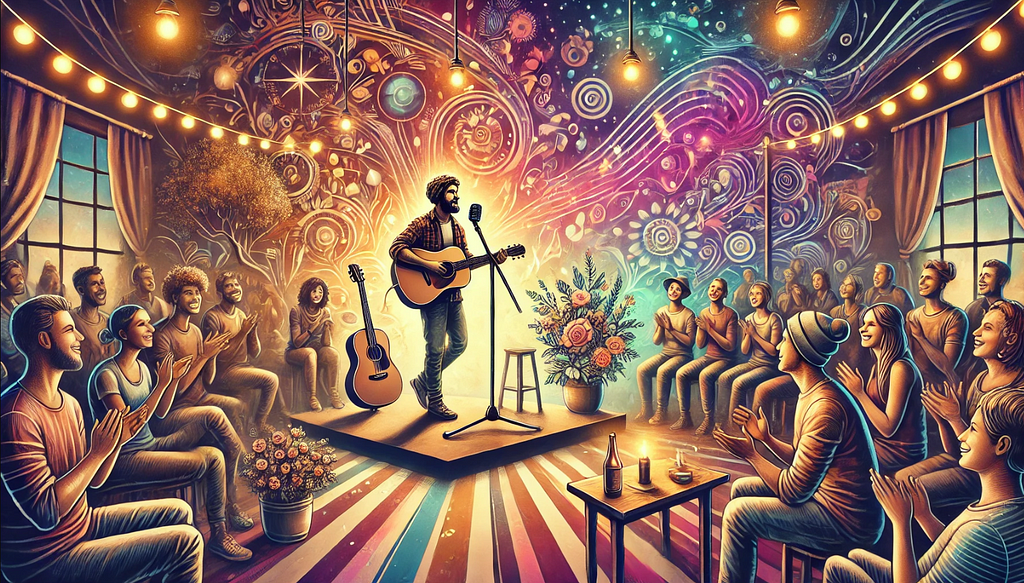Hello friends!
As many of you know, I am writing a book about what musicians and other artists can do through our art to be of service in these turbulent times. I call it, “Soulforce Arts: The Vital Role of Musicians & Other Artists in a World That’s Lost Its Mind.”
I am currently raising funds via Kickstarter to help pay for the many self-publishing costs and would love your support in any way that you wish to give – anything from sharing on social media, to contributing to my Kickstarter campaign, to putting me in touch with anybody in the arts/music or climate change world who might be interested in supporting me.
I am overjoyed that I have already (nearly) reached my minimum goal of $3600, which would cover editing, graphic design, a new website, self-publishing fees, and taxes. I am now setting my sights on my more ambitious goal, which is to raise $8000 so that I could pay for 150 hard copies of my book to sell at events, and for professional marketing help. Remember, the way Kickstarter works is that if I don’t reach my goal, I don’t get any of the money, so the pressure’s on!
In the meantime, here’s another excerpt from my chapter on livelihood for musicians and other artists. It’s about understanding the roots of the “icky” feeling many of us have about money. Enjoy!
Cheers,
Joseph
The “Ick” of Money
“The love of money is the root of all evil.”
— Adage
“How is an artist to nourish himself in an age whose values are market values?”
— Lewis Hyde, The Gift
One of the great challenges of our time — for artists and nearly everybody else — is the disconnection between the incentives and rewards of our economic system and our genuine gifts and needs. This misalignment can be seen and felt in countless ways, most notably in how the work which brings the greatest reward (which, in our society, are fame, money, and power) is often the most destructive and soul-destroying, and how the work that brings the most healing and fulfillment is often the least rewarded.
This misalignment is felt acutely by artists and healers because, not typically being centrally-motivated by fame, money, and power, we are often willing to sacrifice these in service of a higher goal: namely, beauty and healing. But even though we ourselves know the value of this higher goal, the paltry rewards many of us get in response to our valuable gifts can lead to the disillusionment and despair of the “starving artist.”
On top of all of this are a multitude of beliefs and feelings we carry about money. Many artists have a deep distrust of money, a fear of appearing to be greedy, a distaste of “playing the game,” or even a belief that earning money is somehow immoral or counter to the essence of art. And so we find ourselves in a double-bind: we often have this deep distrust of what it takes to make money, and yet having more money feels good (at least, in some ways), and we certainly need money in order to survive in our society. Thus, many of us find ourselves in a constant state of anxiety and misgivings, wanting to honor our own integrity and that of our art, and yet constantly making compromises in order to pay our bills.
Far from being a sign that there’s something wrong with you or your gifts, I believe that any disillusionment and anxiety you may feel around career and money are really signs that you’re seeing things accurately. In our current system of the world, the arts and healing are not typically valued and rewarded to the extent, and in the ways, that our souls know that they should be. When you see your gifts traded for mere cash and when you see people get rewarded for “playing the system” rather than for creations of authentic beauty, the “ick” that you feel is the recognition of the disconnection between your gifts and your rewards. Essentially, this is because money, being a fictional, abstract entity with no inherent value of its own, is a poor substitute for the genuine love, connection, and freedom that we all want — deep down — in return for our gifts.
The ick goes deeper. As we’ve explored elsewhere in this book, our economic system has certain maladaptive tendencies built in, including money’s apparent permanence (everything else in nature decays over time) and the institution of interest-bearing debt, two features which incentivize hoarding and artificial scarcity. In brief, here’s how it works: since more money typically affords more survival value and more power, then everyone in a money-based system has the incentive to hoard as much as possible, as quickly as possible, at the expense of other people and the planet, or else be subjugated by someone else who hoarded yet more money in less time. With such a slant to the playing board, it’s little wonder why so much inequality, war, and ecological destruction has occurred throughout history! I believe that the violence, greed, and selfishness that is commonly (and I believe, mistakenly) attributed to “human nature” is actually a result of this slant, which turns people’s natural generosity into a liability and cuts us off from one another at every turn. If the arts are, in their essence, a gift in celebration of life and human connection, then it’s no wonder that artists feel ill at ease in this economic terrain.
So what are we to do? Is living within this system a life-time sentence to the “ick”? It can be, but only to the extent that we accede to the system more than is necessary to survive within it. Use the following writing exercise to understand the ways and degree to which you unduly agree to the ethos and worldview of our current money system.
Practice 11.1 — Getting to Know Your Money Story
Get out your journal and write down 20 beliefs that you have about money and your career as an artist, such as “Money is hard to come by,” “Money just gets in the way of true artistic expression,” or “I love money and don’t mind working my ass off to get it!” Even if you get stuck at 10 belief statements, stick with the exercise and wait for another 10 beliefs to arise. See if you can get all of your beliefs about money out on paper — you might be surprised to discover what’s in there!
Next, put a star next to the beliefs that have the biggest emotional charge for you. Read them a few times and let them sink in. To what extent are these beliefs ruling your life? Do these beliefs limit what you allow yourself to do? How have they shaped your life as it currently is?
Spend another 10 minutes writing about where these beliefs came from in your past and what your future might look like if you didn’t change them. I promise that this will be time well spent — getting in touch with the stories that have been ruling your life is absolutely essential for moving past them.
The good news is that even though we live in this system (which is only possible to escape by becoming a Stone-Age hunter-gatherer in the wilderness somewhere), we don’t have to live by its ethos and worldview; by stepping into a new story of money, one based on the Story of Interbeing, we can reorient our lives so that our means of making money (and otherwise supporting ourselves) are in alignment with the love, connection, and freedom we want. I call this new story “Soulforce Livelihood.”




